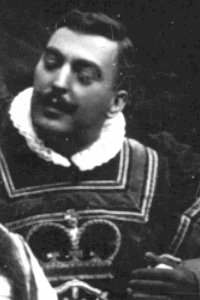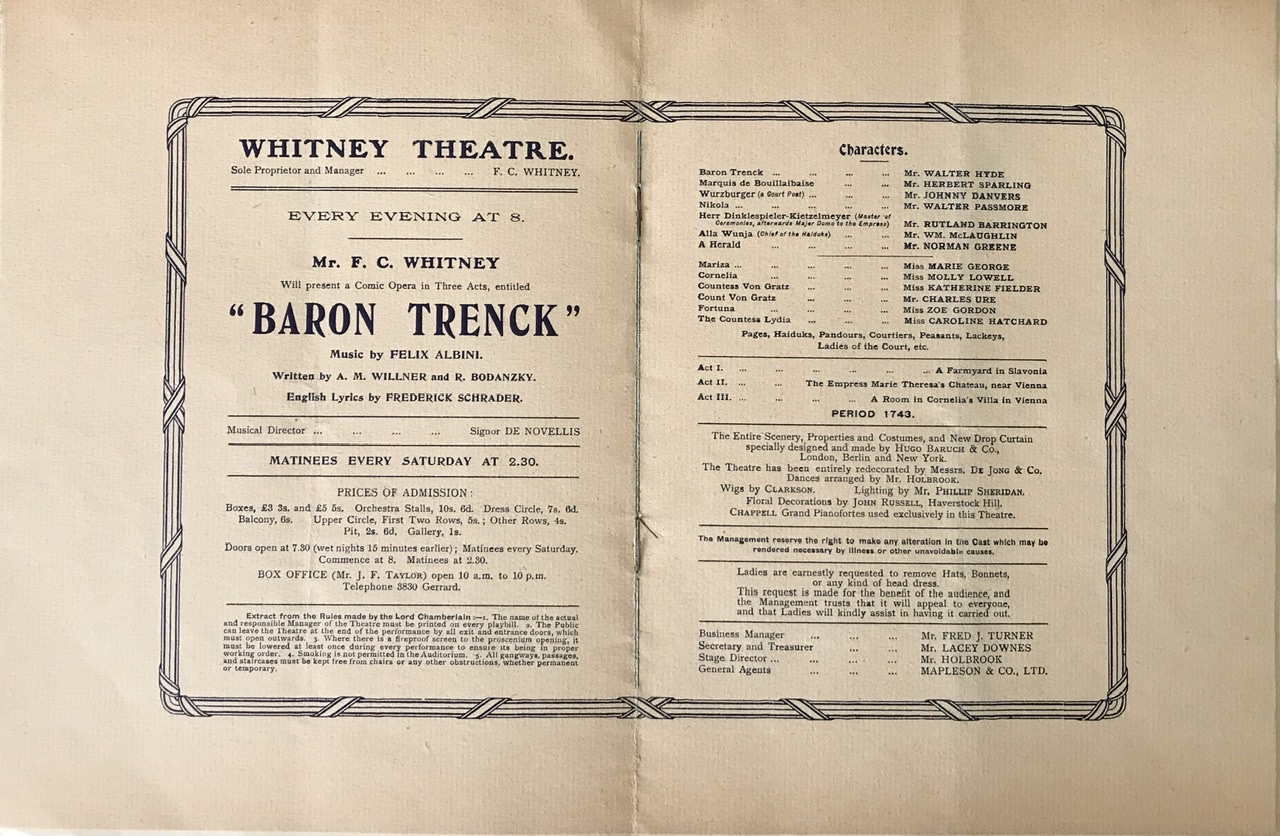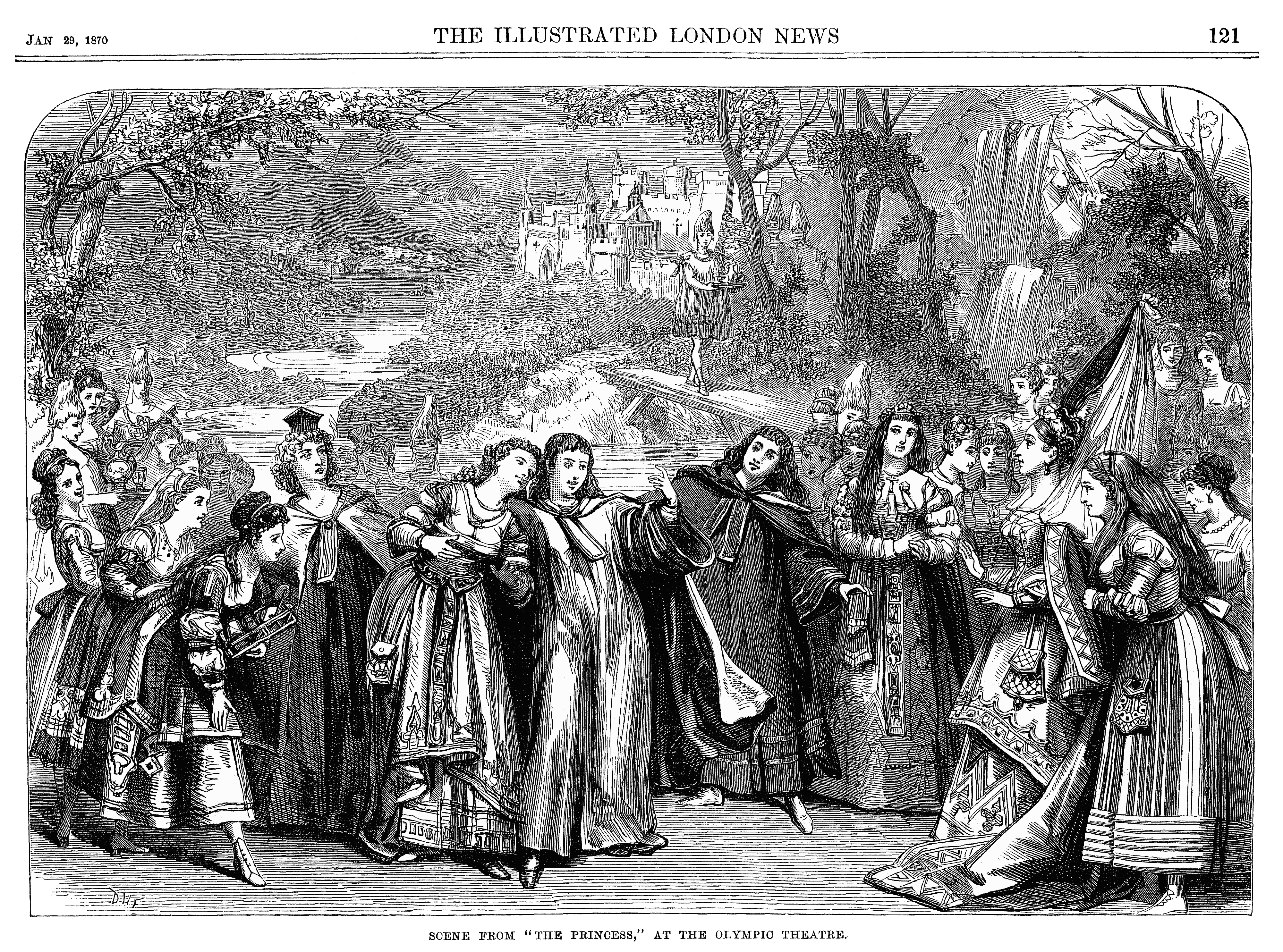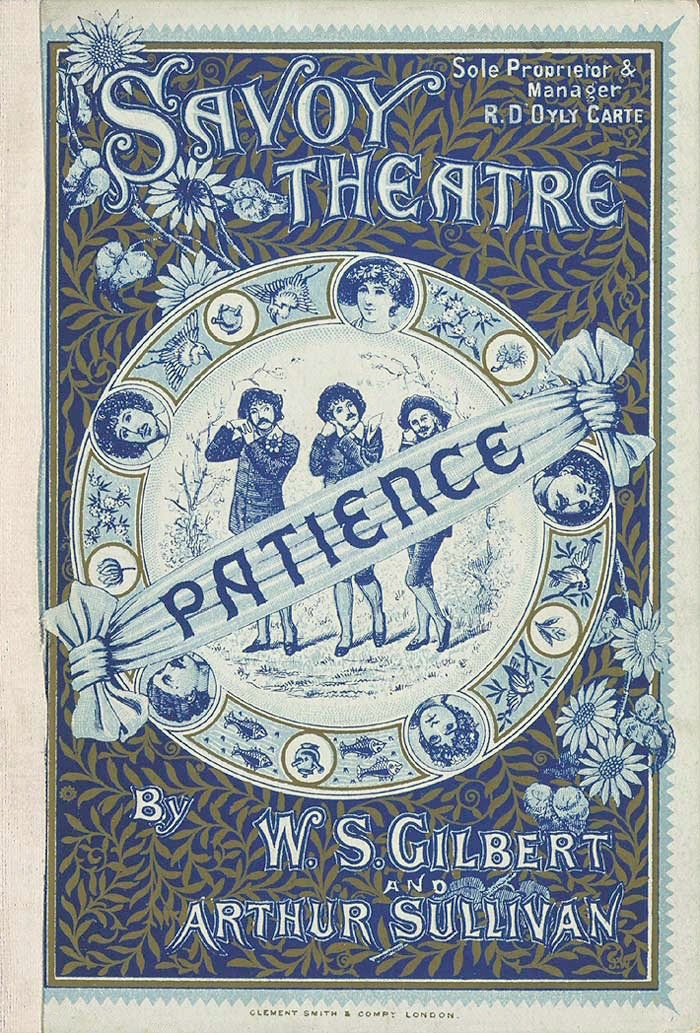|
Pacie Ripple
Pacie Ripple (20 April 1864 – 16 April 1941) was an English operatic tenor known for playing in the operas of Gilbert and Sullivan from 1889 to 1890 and again from 1903 to 1907. He later had a career as a performer in the United States. There he created roles in such long-running hits as ''A Trip to Chinatown'', ''The New Moon'' and ''Anything Goes''. Later in life he told some colourful fibs about his birth, early training and career. Early life and career Ripple was born as Arthur Boole in Ecclesfield, Yorkshire, in 1864, the son of Maria ''née'' England (1840–1885) and Robert Boole (born 1835), a labourer in an iron works and later a foreman gasfitter. By 1881 Arthur Boole was working as an engine pattern maker in his native town. Later in life he claimed to have trained at the Guildhall School of Music and to have worked for the director of the Leeds Festival before making his operatic début in Italy as the Duke in ''Rigoletto''. He was a member of the chorus and an ... [...More Info...] [...Related Items...] OR: [Wikipedia] [Google] [Baidu] |
Sex (play)
''Sex'' is a 1926 play written by and starring Mae West, who used the pen name "Jane Mast". Staged on Broadway, the play received bad reviews, but was a commercial success. It was eventually shut by the NYPD due to obscenity and West spent time in jail because of it. Plot Act One The play opens at Rocky's residence on Caidoux Street in Montreal's red light district. Rocky receives an unwanted visit from Dawson, a police officer he has been paying off to keep quiet about a murder. Rocky offers Margy, a prostitute who works for him, as payment to Dawson, but she refuses. Dawson leaves without trouble, but swears to return for his money. Margy longs to leave Rocky for a better life, but she currently has no realistic alternative. Rocky leaves for a date with a "society dame", whom he plans to seduce and blackmail. Once Rocky has left, Margy receives several visitors. The first is her best friend Agnes, who, despite Margy's warnings about rejection, plans to return home to her parent ... [...More Info...] [...Related Items...] OR: [Wikipedia] [Google] [Baidu] |
Mae West
Mae West (born Mary Jane West; August 17, 1893 – November 22, 1980) was an American stage and film actress, playwright, screenwriter, singer, and sex symbol whose entertainment career spanned over seven decades. She was known for her breezy sexual independence, and her lighthearted bawdy double entendres, often delivered in a husky contralto voice. She was active in vaudeville and on stage in New York City before moving to Los Angeles to begin a career in the film industry. West was one of the most controversial movie stars of her day; she encountered problems especially with censorship. She once quipped, "I believe in censorship. I made a fortune out of it." She bucked the system by making comedy out of conventional mores, and the Depression-era audience admired her for it. When her film career ended, she wrote books and plays, and continued to perform in Las Vegas and the United Kingdom, on radio and television, and recorded rock 'n roll albums. In 1999, the American Film ... [...More Info...] [...Related Items...] OR: [Wikipedia] [Google] [Baidu] |
The Farmer's Wife (play)
''The Farmer's Wife'' is a romantic comedy play by the British writer Eden Philpotts, based on the scenario of his novel ''Widecombe Fair'' (1913). It was first staged in Birmingham in 1916. Its London premiere was at the Royal Court Theatre in 1924. By 1926 when Laurence Olivier went on tour in the lead role, the play had already been performed 1,300 times. Synopsis After his wife dies, a farmer goes through an elaborate attempt to persuade one of his various female neighbours to marry him without realising that the ideal woman is already working as his housekeeper. Adaptations Film The source novel was itself made into a separate film in 1928, directed by Norman Walker. The play was twice adapted to film: the 1928 silent film ''The Farmer's Wife'', directed by Alfred Hitchcock and starring Jameson Thomas and Lillian Hall-Davis, and the 1941 sound film ''The Farmer's Wife'', directed by Leslie Arliss and starring Basil Sydney and Patricia Roc. Television Two versions of the p ... [...More Info...] [...Related Items...] OR: [Wikipedia] [Google] [Baidu] |
Baron Trenck
''Baron Trenck'' is a comic opera in three acts loosely based on the life of Baron Franz von der Trenck. The original German-language work was composed by Felix Albini to a libretto by Alfred Maria Willner and Robert Bodanzky and premiered at the Stadttheater in Leipzig in 1908. The English version, adapted by Frederick Franklin Schrader and Henry Blossom, ran for just 43 performances at the Strand Theatre in London in 1911. It starred Walter Passmore, Walter Hyde and Caroline Hatchard. Production Based on a 1908 German work of the same name first performed at the Stadttheater in Leipzig, ''Baron Trenck'' ran at the Whitney Theatre (Novello Theatre, Strand Theatre) from 22 April 22nd to 3 June 1911. The original score was by Felix Albini with additional music by Alfred G. Robyn to a book and lyrics by Alfred Maria Willner and Robert Bodanzky. The English version was adapted by Frederick Franklin Schrader and Henry Blossom, while the Director and choreographer was Al Holbrook ... [...More Info...] [...Related Items...] OR: [Wikipedia] [Google] [Baidu] |
Savoy Theatre
The Savoy Theatre is a West End theatre in the Strand in the City of Westminster, London, England. The theatre was designed by C. J. Phipps for Richard D'Oyly Carte and opened on 10 October 1881 on a site previously occupied by the Savoy Palace. Its intended purpose was to showcase the popular series of comic operas of Gilbert and Sullivan, which became known as the Savoy operas. The theatre was the first public building in the world to be lit entirely by electricity. For many years, the Savoy Theatre was the home of the D'Oyly Carte Opera Company, which continued to be run by the Carte family for over a century. Richard's son Rupert D'Oyly Carte rebuilt and modernised the theatre in 1929, and it was rebuilt again in 1993 following a fire. It is a Grade II* listed building. In addition to ''The Mikado'' and other famous Gilbert and Sullivan premières, the theatre has hosted such premières as the first public performance in England of Oscar Wilde's '' Salome'' (1931) and No� ... [...More Info...] [...Related Items...] OR: [Wikipedia] [Google] [Baidu] |
The Mikado
''The Mikado; or, The Town of Titipu'' is a comic opera in two acts, with music by Arthur Sullivan and libretto by W. S. Gilbert, their ninth of fourteen Gilbert and Sullivan, operatic collaborations. It opened on 14 March 1885, in London, where it ran at the Savoy Theatre for 672 performances, the second-longest run for any work of musical theatre and one of the longest runs of any theatre piece up to that time.The longest-running piece of musical theatre was the operetta ''Les Cloches de Corneville'', which held the title until ''Dorothy (opera), Dorothy'' opened in 1886, which pushed ''The Mikado'' down to third place. By the end of 1885, it was estimated that, in Europe and America, at least 150 companies were producing the opera.H. L. Mencken, Mencken, H. L.]Article on ''The Mikado'', ''Baltimore Evening Sun'', 29 November 1910 ''The Mikado'' is the most internationally successful Savoy opera and has been especially popular with amateur and school productions. The work has ... [...More Info...] [...Related Items...] OR: [Wikipedia] [Google] [Baidu] |
Princess Ida
''Princess Ida; or, Castle Adamant'' is a comic opera with music by Arthur Sullivan and libretto by W. S. Gilbert. It was their eighth operatic collaboration of fourteen. ''Princess Ida'' opened at the Savoy Theatre on 5 January 1884, for a run of 246 performances. The piece concerns a princess who founds a women's university and teaches that women are superior to men and should rule in their stead. The prince to whom she had been married in infancy sneaks into the university, together with two friends, with the aim of collecting his bride. They disguise themselves as women students, but are discovered, and all soon face a literal war between the sexes. The opera satirizes feminism, women's college, women's education and Charles Darwin, Darwinian evolution, which were controversial topics in conservative Victorian era, Victorian England. ''Princess Ida'' is based on a narrative poem by Alfred, Lord Tennyson called ''The Princess (Tennyson poem), The Princess'' (1847), and Gilb ... [...More Info...] [...Related Items...] OR: [Wikipedia] [Google] [Baidu] |
Iolanthe
''Iolanthe; or, The Peer and the Peri'' () is a comic opera with music by Arthur Sullivan and libretto by W. S. Gilbert, first performed in 1882. It is one of the Savoy operas and is the seventh of fourteen operatic collaborations by Gilbert and Sullivan. In the opera, the fairy Iolanthe has been banished from fairyland because she married a mortal; this is forbidden by fairy law. Her son, Strephon, is an Arcadia (utopia), Arcadian shepherd who wants to marry Phyllis, a Ward (law), Ward of Court of Chancery, Chancery. All the members of the House of Lords, House of Peers also want to marry Phyllis. When Phyllis sees Strephon hugging a young woman (not knowing that it is his mother – immortal fairies all appear young), she assumes the worst and sets off a climactic confrontation between the peers and the fairies. The opera satire, satirises many aspects of British government, law and society. The confrontation between the fairies and the peers is a version of one of Gilbert's ... [...More Info...] [...Related Items...] OR: [Wikipedia] [Google] [Baidu] |
Patience (opera)
''Patience; or, Bunthorne's Bride'', is a comic opera in two acts with music by Arthur Sullivan and libretto by W. S. Gilbert. The opera is a satire on the aesthetic movement of the 1870s and '80s in England and, more broadly, on fads, superficiality, vanity, hypocrisy and pretentiousness; it also satirises romantic love, rural simplicity and military bluster. First performed at the Opera Comique, London, on 23 April 1881, ''Patience'' moved to the 1,292-seat Savoy Theatre on 10 October 1881, where it was the first theatrical production in the world to be lit entirely by electric light. Henceforth, the Gilbert and Sullivan comic operas would be known as the Savoy Operas, and both fans and performers of Gilbert and Sullivan would come to be known as "Savoyards." ''Patience'' was the sixth operatic collaboration of fourteen between Gilbert and Sullivan. It ran for a total of 578 performances, which was seven more than the authors' earlier work, ''H.M.S. Pinafore'', and the seco ... [...More Info...] [...Related Items...] OR: [Wikipedia] [Google] [Baidu] |







